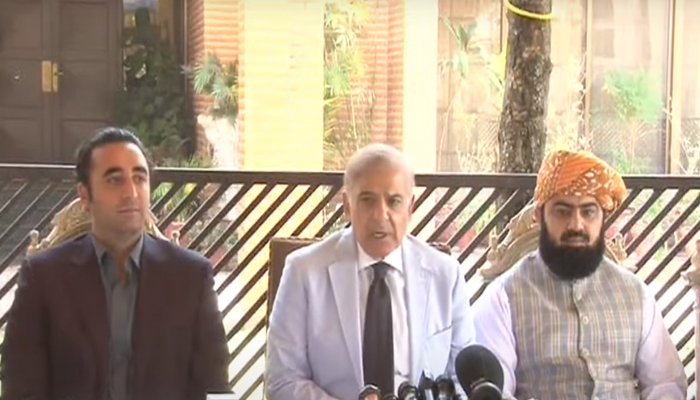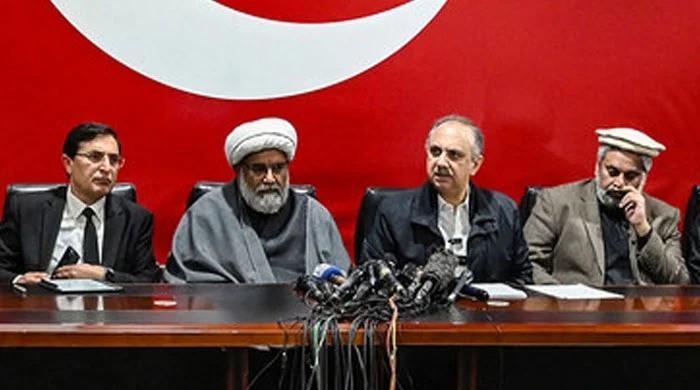Shahbaz Sharif calls out PM Imran Khan for imposing 'civilian martial law'
Joint Oppsoition leaders label April 3 "darkest day in history of Pakistan", terming decision taken by PM Khan "unconstitutional”
April 04, 2022

- Joint Oppsoition leaders label April 3 "darkest day in history of Pakistan."
- Shahbaz Sharif says why wasn't the "foreign letter" issues raised before.
- PPP Chairman Bilawal Bhutto-Zardari says “PM Khan sabotaged the constitution to protect his ego”.
ISLAMABAD: PML-N President Monday lashed out at Prime Minister Imran Khan for imposing 'civilian martial law' in the country, terming his move "unconstitutional".
Addressing a press conference, flanked by PPP Chairperson Bilawal Bhutto-Zardari and JUI-F leader Asad Mehmood, MQM-P Convener Khalid Maqbool Siddiqui, BNP-M Chief Akhtar Mengal and others, he said that PM Imran Khan, along with his party members, have blatantly challenged the Constitution of Pakistan.
“April 3 will be remembered as a black day in the history of Pakistan,” he said, adding that PM Imran Khan imposed civilian martial law, while General Pervez Musharraf also took a similar unconstitutional decision on November 3, 2007.
He termed the four-year tenure of the former PTI-led government a period of “an individual government, totalitarian and fascist.”
Read more: What is Article 5 and does it apply to the no-trust move?
On March 24, speaker of the National Assembly Asad Qaiser granted leave to the no-confidence motion against Prime Minister Imran Khan, according to the will of the House.
Recalling Sunday’s ruling of the NA deputy speaker regarding the no-confidence motion, he asked, “if Qasim Suri termed the motion as ‘unconstitutional’, why wasn’t it raised earlier?”
“PTI used Article 5 to prevent themselves from the embarrassment that they would have faced after their defeat in case of voting on the no-confidence motion,” Shahbaz said.
Shahbaz highlights flaws in 'foreign letter' controversy
Regarding the “foreign threat letter” controversy, the leader of the Opposition in the National Assembly said that Pakistan’s Ambassador Asad Majeed hosted a farewell dinner on March 16 and invited all US officials, even those who were accused by PM Imran Khan.”
Moreover, he added that, in his tweet, Asad Majeed thanked Donald Lu over good relations and cooperation.
Read more: PM Imran Khan discloses name of US official who sent ‘threat letter’
“If the letter was dated March 7 and highlighted the involvement of Donald Lu, why was the ambassador acknowledging the US official during the dinner on March 16,” he highlighted, questioning why Lu was invited for the dinner if had threatened Pakistan.
The PML-N leader said that if they had received the “foreign letter” on March 7, then “why did they not highlight this issue earlier.”
“According to the speech given by the NA deputy speaker, all Opposition leaders became traitors,” he said, adding that yesterday’s NA proceedings made a joke of the constitution of Pakistan, laws and Parliament.
Regarding former information minister Fawad Chaudhry’s claims about challenging the speaker’s ruling, Shahbaz said: “It is right that no one can challenge the proceedings of the House but the Constitution was blatantly violated, does it have any protection?”
He said that the matter is in the Supreme Court and hence, “I will not talk much about it.”
PM Khan sabotaged constitution to protect his ego: Bilawal
PPP Chairman Bilawal Bhutto-Zardari said: “PM Khan sabotaged the constitution to protect his ego”.
He added that PM Khan has no idea what happened.
He further added that the responsibility of protecting the constitution lies on the people of Pakistan and not just the parties.
Bilawal shared that PPP workers and supporters are happy that the rule of the “selected” government has finally ended; however, he said that political parties, like PPP, PML-N, etc, will never be happy if extra-constitutional steps are taken because “we abide by the laws of the constitution.”
Read more: President Alvi writes to Imran Khan, Shahbaz for appointment of caretaker PM
“PM Imran Khan, President Arif Alvi, NA speaker and deputy speaker have all broken the laws in order to protect the ego of the premier,” he said, urging the people to decide what is more important the “constitution or PM Imran Khan’s ego.”
Bilawal urges SC to form full-court bench
Speaking about his grandfather, Zulfiqar Ali Bhutto, he said that today [April 4] is the day when Bhutto was assassinated and PPP has not been able to get justice on this issue.
He highlighted that the Supreme Court did not take notice of the martial laws imposed by General Zia-ul-Haq and General Pervez Musharraf but “we do hope that the SC takes notice of the unconstitutional act of PM Imran Khan.”
“We request the judiciary to form a full-court bench for this critical situation,” he requested, adding that the judiciary’s decision will determine the fate of the country.
Read more: SC hears suo motu notice on constitutional crisis with reference on Article 63A
Moreover, the PPP chairman added that if they want to hang them to death they can but before that, they should allow voting on a no-confidence motion.
“If we are unable to implement the laws according to the Constitution in the National Assembly then we won’t be able to do it in the country,” he maintained.
April 3 darkest day in history of Pakistan: JUI-F leader
“Yesterday [April 3] was the darkest day in the history of Pakistan,” JUI-F leader Maulana Asad Mahmood said, adding that PM Imran Khan is trying to pressurise the institutions.
Read more: Legal experts shed light on govt's controversial decisions
Mahmood said that they [the joint Opposition] will not accept international pressure being imposed under the guise of a “threat letter”.
He suggested that the higher courts of Pakistan hold him PM Khan accountable for his statements regarding the credibility of judges.











